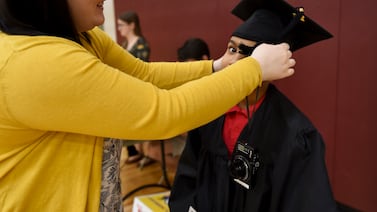Sign up for Chalkbeat Philadelphia’s free newsletter to keep up with the city’s public school system.
Philadelphia students made some nominal gains in their standardized test scores last school year, but most remain below proficiency, according to new data released by the state on Tuesday.
In addition, major gaps between student groups remain. Black students are still scoring far below their white and Asian peers in all subjects. And students from economically disadvantaged backgrounds are struggling to achieve proficiency.
“We are on the right track but the data also tells us we have an awful long way to go,” Superintendent Tony Watlington said at a school board meeting last month when releasing some initial test score data. “It absolutely is not enough.”
Spokespeople for the Philadelphia school district did not release any new statements or comments on the scores as of Tuesday evening.
Philly schools are in the midst of implementing a $70 million curriculum update for English Language Arts, math, and science. District officials have praised the new instructional materials as “state-of-the-art” and a core part of Watlington’s five-year strategic plan for improving the district.
But, Watlington has acknowledged that new curriculum overhauls can often lead to early “implementation dips” at the start, as students and educators get adjusted to the new materials. In the long run, Watlington said last month, he expects these curriculum changes to have significant benefits for students.
“When you try something new, outcomes get worse before they get better. It’s very common in education,” Watlington said at October’s Goals and Guardrails meeting.
Scores released Tuesday from the 2023-2024 Pennsylvania System of School Assessment, or PSSA, show that about a third of Philly students score proficient or above in English Language Arts (ELA), and only a fifth did so in math. The percentage proficient in ELA was unchanged from the prior year, while in math, the percentage increased by 1.4 percentage points. In science, the share of students performing at or above proficiency improved by .3 percentage points.
In ELA, 34.2% of Philly students in grades 3-8 scored proficient or above in 2023-24 — the same percentage as in 2022-23. Statewide, students’ English Language Arts proficiency decreased from 54.5% in 2022-23 to 53.9% in 2023-24.
In math, 21.8% of Philly students in grades 3-8 scored proficient or above in 2023-24, an increase from the 20.4% scoring proficient of above in 2022-23. Statewide, 40.2% of all students scored proficient or above in math in 2023-24.
In science, 41.3% of Philly students in grades 4 and 8 scored proficient or above in 2023-24 compared to 41% the previous year. Statewide, 59.2% of students in those grades scored proficient or advanced in 2023-24.
In ELA, just 24.6% of Black students reached proficiency, compared to 57.7% of white students and 61.6% of Asian students. For Hispanic students, the figure was 23.4%
In math, all groups had lower proficiency rates than in ELA, and the achievement gaps were even bigger. Just 10% of Black students and 12% of Hispanic students reached proficiency, compared with 46.8% of white students and 55.3% of Asian students.
Test scores for students with disabilities fell in all subjects last year, something district officials say they “have a very robust plan” to improve.
Senior Reporter Dale Mezzacappa contributed to this story
Carly Sitrin is the bureau chief for Chalkbeat Philadelphia. Contact Carly at csitrin@chalkbeat.org.






